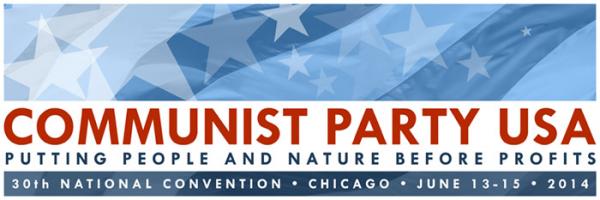
Submitted by John Bachtell, Chicago, IL
Another major electoral battle is shaping up in November that will determine the political terrain of struggle for the next period. Some on the left are less than enthusiastic about throwing themselves into this battle, not seeing any difference between Democrats and Republicans and the viability of change through elections dominated by the two-party system.
This approach doesn’t see the need for multi-class united front electoral alliances and the strategic objective of a decisive defeat of right wing extremism. But perhaps lying much deeper is the idea that radical change and the revolutionary transition to socialism will not occur via the electoral path.
Envisioned instead is change mainly through demonstrations and strikes. Socialism will be ushered in via a general strike during a crisis of capitalism. The capitalist state will be smashed in one blow and a socialist state established in its place. Some see change only through force and violence based on their understanding of the Russian or Cuban revolutions, or even our Civil War.
The CPUSA has long argued against this mischaracterization of history and its implications for our path to US socialism because it has nothing to do with contemporary realities and institutions, traditions and history of democratic struggles. In addition, arguments that place violence as the principle – and only – means to a socialist United States undermines mass democratic involvement. This approach will never win majority support among the American people. Such notions reinforce ruling class stereotypes of communists.
The CPUSA has long said the transition to US socialism will be much more prolonged and complex. The left’s challenge is to involve the active participation of the overwhelming majority of Americans. Just like the socialist society we envision – peaceful, humane and democratic – so too must be the path as it will shape every aspect of the new society.
Marx and Engels foresaw the possibility of peaceful transition particularly under conditions of the democratic or bourgeois republic. Engels wrote in Critique of the Erfurt Program: “One can conceive that the old society may develop peacefully into the new one in countries where representatives of the people concentrate all power in their hands, where, if one has the support of the majority of the people, one can do as one sees fit in a constitutional way; in democratic republics such as France and the USA…”
Even Lenin initially thought possible a peaceful transition to workers and peasants power in Russia, which mainly happened as a result of the crisis brought on by WWI but before the armed intervention of western imperialist powers changed the course of history.
The state
Such a process inevitably raises the question: Can the state in the stage of monopoly capitalism, be an arena of class struggle? Can the working class make inroads, gain power and even transform the state for its own purpose?
The state is the form where a class asserts its common interests and includes legislature, judiciary and the armed forces. A revolutionary transition under conditions of advanced monopoly capitalism is exceedingly complex where the capitalist state is far more developed. Its institutions, the ideological, bureaucratic and coercive apparatus have undergone centuries of development. How a struggle is conducted against the most heavily armed and powerful ruling class in history is no small matter.
The contest for power involves winning the ideological and political battle in civil society and the institutions of state as well, chief among them the democratic legislative arena. With the decisive conquest of political power, the working class will use this power to “wrest by degrees all capital from the bourgeoisie, to centralize all instruments of production in the hands of the state…” wrote Marx and Engels in the Communist Manifesto.
The state it seems is not smashed but “reshaped” (in the words of Engels) in accordance with the balance of class and social forces from an instrument of class oppression and repression, into one of liberation. In the process the state is transformed, and the foundations are laid for its eventual withering away.
In this view, power is attained through democratic means, through the working class electing its representatives to legislative bodies and through political action, including strikes and demonstrations. Democratic institutions are transformed in the process – existing ones become more democratic and new ones arise to extend and deepen participation.
Political power is wielded to transform the state apparatus at every level, even while the economy is dominated by monopoly capital. Curbing monopoly power restricts their ability to resist, obstruct and use violence against a revolutionary working class movement.
The working class can redirect social development by embarking on a path of converting the economy from one dependent on fossil fuels to one based on renewable resources, while retrofitting buildings and homes and rebuilding and modernizing the infrastructure; from one based on militarization to peaceful purposes.
It can radically expanding investment in the public sector, including education and public health care systems, public parks and recreation and the arts, establishing public banks, utilities and cooperatives; redistribute wealth through progressive taxation; and expand democratic rights and end discriminatory practices. It can also begin the process of demobilizing the repressive apparatus of the state, by instituting new policies that democratically control the police and begin demobilizing the standing army, implementing a peaceful foreign policy and destroying weapons of mass destruction.
The ability to carry out such reforms, their scale and scope, depends on the social and class balance of forces. The more favorable they are for the working class, the more radical the reform and change.
Expanding electoral participation
Marx foresaw the possibility of achieving socialism through universal suffrage. “A historical development can remain ‘peaceful'” wrote Marx, “only for so long as its progress is not forcibly obstructed by those wielding social power at the time. If in England, for instance or the United States, the working class were to gain a majority in Parliament or Congress, they could, by lawful means, rid themselves of such laws and institutions as impeded their development, through they could only do so insofar as society had reached a sufficiently mature development.”
Given the development of democratic institutions and traditions in the US, involvement in the electoral arena and political action is essential and grows in importance. It entails building broad anti-ultra right, reform and anti-monopoly coalitions that win majorities and thus power in every democratic institution e.g., school boards, planning boards, city council, county boards, state legislature, federal office, in “red” and “blue” states.
The process underway in Central and South America where socialist oriented movements are in power and leading a transition to socialism (i.e., Venezuela, Brazil, Nicaragua, El Salvador, etc) is particularly relevant to our reality. Revolutionary transformation is proving infinitely more complex and protracted than many appreciated. Victories are won by degrees, beginning with small reforms and leading to more radical ones, of gradually supplanting market capitalism with socialist oriented policies.
This type of transition is by and large peaceful, utilizing the democratic structures and mobilizing millions, notwithstanding the provocations and resistance of the domestic corporate class and US imperialism.
There are important electoral victories that can be built upon in the U.S., including the historic Obama victories and in New York City where the new progressive reform mayor and city council are challenging income inequality, school privatization and the city’s stop-and-frisk/racial profiling policies. Other progressive victories including the election of Ras Baraka as mayor of Newark, the election of socialist Kshama Sawant in Seattle and the sweep of labor candidates in Lorain, Ohio, raise the possibility for initiating broad reforms.
These advances, including the emergence of a labor led third party, are possible through greater activism in the electoral arena. This means the imperative of expanding voter rights, including restoring them for presently and previously incarcerated, building a grassroots independent voter education and mobilization apparatus – and left candidacies. Likewise expansion of the democratic process will ease restrictions on third parties and limit the power of money. The “Move to Amend” fight to repeal Citizen’s United is essential.
All this underscores the key political task for the 30th national convention – an all out effort to build the broad labor led democratic movement and build the Party in all directions. But this can’t be separate and apart from involving the Party and the mass movements in the 2014 elections to defeat right wing extremism.
The views and opinions expressed in the Convention Discussion are those of the author alone. The Communist Party is publishing these views as a service to encourage discussion and debate. Those views do not necessarily reflect the views of the Communist Party, its leading bodies or staff members. The CPUSA Constitution, Program, and all its existing policies remain in effect during the Convention discussion period and during the Convention.
For details about the convention, visit the Convention homepage
To contribute to the discussion, visit the Convention Discussion webpage
CONVENTION DISCUSSION
30th National Convention, Communist Party USA
Chicago | June 13-15, 2014


 Join Now
Join Now